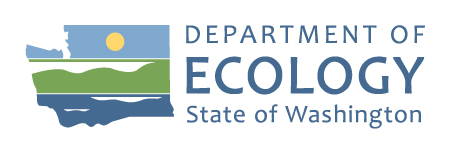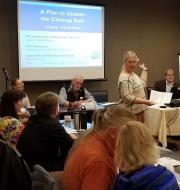Updating the MTCA Cleanup Rule:
Stakeholder & Tribal Advisory Group (STAG)
Website updated March 3, 2023.
The Model Toxics Control Act (MTCA) Cleanup Rule Stakeholder and Tribal Advisory Group (STAG) is a group of 22 key stakeholders and representatives of tribal interests who have practical experience with contaminated site cleanups in Washington state.
What's the latest?
Ecology filed the rule proposal (CR-102) on Wednesday, February 15, 2023.
Comments will be accepted online and by mail through Sunday, April 16, 2023.
Ecology will hold two public hearings March 23 and 27, 2023, and plans to adopt the rule amendments in August 2023.
Visit Ecology's website for more details. To request ADA accomodations, see the contact information below public hearings.
- Proposal Notice: CR-102 form
- Proposed rule language
- Preliminary Regulatory Analyses
- SEPA Determination of Nonsignificance and Environmental Checklist
Additional documents available to help you review the rule proposal:
- *NEW* Proposed rule text with tracked changes to Preliminary Draft 2 (PD2) in PDF and Word. This document reflects STAG members' comments on PD2 and other changes. We provided the document to STAG members in March 2023.
- Proposed rule text with tracked & footnoted changes to the current rule
- Proposed rule text without tracked changes to the current rule
Public hearings on the proposed rule
- March 23, 2023 @ 10 a.m. (Pacific time)
Webinar only via Zoom
Join March 23 webinar online
Join by phone (audio only): Call toll free 253-215-8782 and enter Meeting ID: 856 6571 0963
- March 27, 2023 @ 5 p.m. (Pacific time)
Webinar only via Zoom
Join March 27 webinar online
Join by phone (audio only): Call toll free 253-215-8782 and enter Meeting ID: 871 1342 5365
- To request ADA accommodations, contact Ecology’s ADA Coordinator by March 16, 2023, at:
- Phone: 360-407-6831 (voice)
- TTY: 877-833-6341 or 711 relay service
- Email: ecyadacoordinator@ecy.wa.gov
*NEW* Site Hazard Assessment and Ranking Process (SHARP) Tool Comment Period
A draft of the Site Hazard Assessment and Ranking Process (SHARP) Tool, Ecology’s new procedure for ranking MTCA sites, is available for review and comment by the public through April 16, 2023. Ecology is developing the tool to implement our proposed update of the MTCA Cleanup Regulations (Chapter 173-340 WAC), which includes new requirements for SHARP.
You can learn more about the SHARP Tool on Ecology’s blog. If you still have questions, please contact Eileen Webb, Ecology’s project manager for the tool.
________________________________________________________________________
What is the Stakeholder & Tribal Advisory Group?
Cleanup Rule Stakeholder and Tribal Advisory Group (STAG) is a group of 22 key stakeholders and representatives of tribal interests who have practical experience with contaminated site cleanups in Washington state. Check out the member roster.
Contaminated site cleanups are driven by Washington's environmental cleanup law and regulations--the Model Toxics Control Act and the MTCA Cleanup Rule. Both law and rule set standards that help ensure cleanups protect your health and environment.
The Cleanup Rule hasn't been fully updated since 2001. In December 2018, the Washington State Department of Ecology began a multi-year process to update it and we recruited the advisory group to help.
What will this group do?
- Provide diverse perspectives, advice, and feedback as Ecology staff update the Cleanup Rule over the next few years. Learn about the rulemaking plan, below.
- Serve as ambassadors who represent the diverse interests and concerns of their organizations or communities.
- Build a shared understanding of the rulemaking process, options, and emerging proposals.
- Meet in Bellevue, WA, and meet online via Zoom webinar, about 12 times between September 2019 and December 2022.
- Reimbursement for travel expenses will be possible for those outside the Seattle/Bellevue metropolitan area.
- Read the STAG charter.
What do STAG members have in common?
- Real-world experience with the MTCA cleanup process, including consultants, site owners or operators, public managers, and members of affected communities.
- An interest in making improvements to the Cleanup Rule and willingness to work within MTCA's fundamental statutory framework.
- Experience working successfully and collaboratively in an advisory group setting.
- Ability to serve through at least the first and second rulemakings through 2022, and participate in up to 12 STAG meetings in Bellevue, WA, during that time.
- A willingness to reach out to their organization or constituency, keep them informed, and bring their constituency's ideas and advice back to the table.
Why is STAG input vital for updating the MTCA Cleanup Rule?
There are nearly 14,000 contaminated sites in Washington. More than 7,500 of these sites have been cleaned up, but 200 to 300 new ones are discovered and reported each year. It will be critical to gather input from diverse voices, perspectives, and geographic areas as we update the rule. We'll be seeking STAG input such as language changes to make the rule easier to understand; process changes to make cleanups more efficient, and (during the 2nd rulemaking) input on changes to the cleanup standards themselves.
___________________________________________________________________________
When did the group meet during the First Rulemaking?
Ecology held four STAG meetings in Fall 2022 to review and discuss the second Preliminary Draft (PD 2) for the first rulemaking. Ecology held five STAG meetings to review and discuss the first Preliminary Draft (PD 1) for the first rulemaking.
Watch for schedule updates on this page and the Cleanup Rulemaking webpage--Chapter 173-340 WAC.
|
___________________________________________________________________________
How does Ecology plan to update the Cleanup Rule?
We plan to update the rule in three stages (called “rulemakings”) through 2030. Please note that the following rulemaking schedule is subject to change based on factors beyond our control.
- In the first rulemaking (underway now through 2023), we’ll consider changes related to our processes and procedures for cleaning up sites, including: a) a new system for ranking hazards at contaminated sites; b) a streamlined process for initial investigation, ranking, and listing of sites; and c) improved ways of communicating with the public about sites.
- In the second rulemaking (expected to begin 2024), we’ll update the technical cleanup standards.
- In the third rulemaking (expected to begin 2027), we’ll address any deferred topics or new issues that emerge during the first two rulemakings.
___________________________________________________________________________
What has STAG reviewed in the past?
In the fall of 2022, Ecology shared four versions of the second preliminary draft (PD 2) rule language for the first rulemaking (2018-2023). STAG reviewed for significant issues or concerns and submitted comments by October 13, 2022. The draft rule changes were the same in all four versions; the alternative presentations are intended to aid STAG's review. Review Ecology's briefing paper for context.
- Version 1 shows tracked changes from the first preliminary draft, with footnotes providing additional explanation.
(Version 1 PDF) (Version 1 Word) - Version 2 shows tracked changes from the current MTCA Cleanup Rule (no footnotes).
(Version 2 PDF) (Version 2 Word) - Version 3 shows no tracked changes (i.e., clean version of final preliminary draft).
(Version 3 PDF) (Version 3 Word) - Version 4 shows only the environmental justice and tribal engagement changes.
(Version 4 PDF) (Version 4 Word)
In 2019 and 2020, Ecology shared the first preliminary draft (PD 1) rule language from the first rulemaking (2018–2023) for the following focal topics:
- Site discovery and reporting (Section 300)
- Initial Investigation, Site Hazard Assessment, Listing and Delisting (Sections 310-330)
- Biennial program plans and expenditures (Section 340)
- Leaking Underground Storage Tanks (Section 450)
- Remedy selection: Remedial investigation, feasibility study and disproportionate cost analysis (Sections 350-370)
- STAG comments on draft language
- STAG Supplemental Zoom webinar (July 22, 2020)
- STAG Meeting Workplan 2019–2020
___________________________________________________________________________
More ways you can participate in the rulemaking process:
- Subscribe to Cleanup Rulemaking email list to receive notifications on the cleanup rule update.
- Attend STAG meetings as an observer; public input will be welcome during the last 30 minutes of each meeting.
- Read the STAG meeting summaries once meetings are underway.
- Read about the first rulemaking: Chapter 173-340 WAC
- Learn about our scoping process: Cleanup Rule exploratory rulemaking
Learn more about Ecology's work to clean up Washington's 14,000 contaminated sites:
- "What's in my neighborhood" for cleanups happening in your area
- How the cleanup process works
- Washington's environmental cleanup law, the Model Toxics Control Act (MTCA)
- MTCA Biennial Report of Expenditures: 2020–2021 Biennium with statewide success stories!
Please send questions or comments about this website to MTCARule@ecy.wa.gov

Please Wait...


